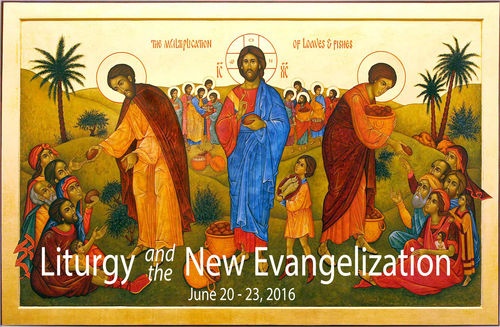The following is an interview conducted with Dr. Michael McCallion of Sacred Heart Major Seminary on evangelization and liturgy from a sociological perspective. Dr. McCallion will speak at the Center for Liturgy’s 2016 Symposium on Liturgy and the New Evangelization at the University of Notre Dame from June 20-23, 2016.
TO: What are the marks of a parish influenced by the new evangelization?
MM: A solid parish staff infrastructure – including a full time youth and young adult minister. For the most part, if there is not a parish staff to implement whatever the pastor, parish council, parish commissions, etc., come up with in terms of implementing the new evangelization, then you are putting the cart before the horse (in my humble opinion). Another mark, then, would be the flourishing of special purpose groups (as sociologists call), that is, people gathering in small groups of all kinds (devotional, liturgical, Christian service, youth, sports, book clubs, educational, scriptural, etc., etc.,).
TO: What role does liturgical prayer play in the evangelization of a parish?
MM: Liturgy plays a major role, sociologically speaking, especially when considering the role of parish devotions and music. Again, if the parish has a solid parish staff, then the parish church can be open every day and night of the week for people to gather to pray devotions (or for moments of private prayer). Regardless, people are gathering -- sociologically very important. Perhaps some parishes could have short morning and evening prayer services (liturgy of the hours) most days of the week (20 minutes top for most parishes, but it depends on the parish) to which parishioners could invite family and friends – opportunities for further “gatherings.” A parish that has a robust devotional and liturgical prayer life is a parish that provides its members opportunities to invite family and friends – a form of evangelization. ALSO, LITURGICAL PRAYER can be a form of play – which gets people out of themselves into the group. CAN’T PRODUCE ALONE: Here is what can make play meaningful. My own experience of play as participation in A LARGER REALITY that also heightened my own sense of being came most often when singing in choir. When one sings with others, the engagement of mind and emotion and body with the music and with the sound being produced by the other singers in the chorus provides a sense of at once being a specific body making a specific sound and a larger body that together makes a sound that none of the chorus members can produce alone. (see Luke Timothy Johnson)
TO: What role does sacramental preparation play?
MM: This is tricky in my opinion, and much depends on knowing the community well. I have witnessed overdrawn sacramental preparation programs turn people away from the church rather than draw them in. My sister, for example, a few years ago had to attend 10 confirmation preparation sessions, then an all-day retreat, and finally an interview with the DRE (with her son). She was a wreck, didn’t have the time, was put off when the DRE asked her where her husband was on two occasions, etc. The preparation became an obstacle to evangelization. Sacramental preparation programs are a real pastoral challenge. Again, I think the staff needs to know the community very well. But if done pastorally and with the virtue of hospitality in mind, then I think these are opportunities for evangelization.
TO: If speaking to liturgists, catechists, or campus ministers, what recommendations would you make from a sociological perspective about how they might pray the Church’s prayer in an “evangelizing” manner?
MM: Today, given that people do not have to be HERE (at church, they could just as easily be somewhere else), the virtue of hospitality needs to be practiced by the pastor, parish staff, community members in a conscious and robust way at the liturgy and elsewhere. How do you pray hospitably? Erving Goffman wrote about “presentation of self” and “impression management” and “saving face” etc., from a micro-sociological perspective. All of these phenomena are important in order to evangelize and evangelize through liturgical prayer. Again, the pastor and parish staff need to know the community well. For example, in terms of the virtue of hospitality, how should this or that be done given the social class, ethnicity, and age of parishioners and members of this particular neighborhood? Does holding hands for the Lord’s prayer during Mass work in this community or not -- or for some and not others? Does the pastor telling parishioners after the entrance hymn to say hello to one another work in this community or is it off-putting (poor evangelization). These are perhaps minor issues but worthy of discussion at council, commission, and staff levels? Moreover, I would add, sociologically, that a parish that truly sings at Mass can be a powerful means of evangelization for guests and other non-Catholics in attendance. So I ask musicians, why is there a hymn every Sunday that I cannot sing? (I have an answer but it is too long for this format). Not knowing the music does not help the community sing and therefore makes the community a poor means of evangelization because it is obvious to anyone (especially a guest) that the community should be singing. The community is not singing and so they must be bored or don’t care – so thinks the guest. Furthermore, why don’t I even know a hymn by heart? Anyway, these liturgical experiences are tricky – from a micro-sociological perspective – and are they liturgical rituals of welcoming or off-putting rituals in this particular community (keeping in mind social class, ethnicity/race, gender, etc.)? I think a community, therefore, that is fully, actively, and consciously participating in the liturgy is praying in an evangelizing manner.



